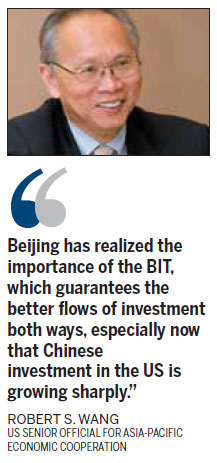Washington to advance talks in investments treaty
The United States will work closely with China to push forward negotiations on the Bilateral Investment Treaty and welcome Chinese investors in a wide range of industries, a senior US diplomat said on Thursday.
"Beijing has realized the importance of the BIT, which guarantees the better flows of investment both ways, especially now that Chinese investment in the US is growing sharply," said Robert S. Wang, the US senior official for Asia-Pacific Economic Cooperation.
"The major move forward of the 'negative list', which is essentially areas having restrictions against foreign investment, has changed the previous approach of conducting investment," he said.
Wang's remarks came two weeks after Premier Li Keqiang and visiting US Secretary of State John Kerry reaffirmed a joint determination to advance BIT negotiations and enhance communication on global issues such as climate change.
The BIT negotiations, which began in 2008, were revitalized in July at the fifth round of the China-US Strategic and Economic Dialogue.
"The treaty will take a long time to negotiate," Wang said, adding that he has noticed more effort from China to accelerate the pace. "This year, we will have four rounds of discussion."
Wang, head of the US delegation, is attending the APEC 2014 First Senior Officials' Meeting in Ningbo, Zhejiang province. Washington aims to advance priorities such as trade and investment liberalization, sustaining growth and connectivity during the 2014 APEC meetings.
Sustaining growth, which is being promoted by the US delegation, involves a broad range of proposals on renewable fuels, anti-corruption efforts and the empowerment of small and medium-sized enterprises, Wang said.

"China is growing very quickly, but the problem is how to sustain growth in an environmentally friendly way," Wang said, adding that Beijing's poor air quality earlier this week is a reminder of the need for immediate action from government and individuals to increase the use of renewable fuels.
Anti-corruption efforts are important because the rapid growth of many Asian economies is often affected by bribery and corruption, which create problems within the system and pose threats to future development, he said.
"As for small and medium-sized enterprises, they are key players in the economy, but sometimes they do not have access to financing or the international market in terms of expansion," he added.
In recent years, subregional trading blocks such as the Trans-Pacific Partnership Agreement and the Regional Comprehensive Economic Partnership have emerged in the Asia-Pacific, drawing criticism for what seems to be a fragmenting of the economic integration process among APEC members.
Describing trading blocs as "devoted to lowering trade barriers on a voluntary basis", Wang said in the end their goals are the same, namely, calling for a better trade and investment environment.
"It is just like people taking different trains. At some point, we may have to figure out how to be efficient with so many trains. But they are going to the same direction in terms of building cooperation," he said.
Wang said APEC, a trading "gardener", has helped members nurture industries and reduce tariffs, which accounts for record growth in the region.
"One of the most unique things about APEC is how the private sector supports it," Wang said. "They benefit from all the capacity building, all the work APEC does to make their business smoother."
Beijing assumed the position of APEC host at the beginning of this year, and is expected to host more than 100 APEC meetings and related events throughout the year under the theme of "Shaping the Future through Asia-Pacific Partnership".
puzhendong@chinadaily.com.cn
(China Daily 02/28/2014 page10)








